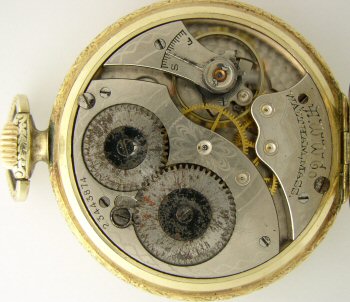
| WWT Shows | CLICK TO: Join and Support Internet Horology Club 185™ | IHC185™ Forums |

|
• Check Out Our... • • TWO Book Offer! • |
Welcome Aboard IHC185™  Internet Horology Club 185
Internet Horology Club 185  IHC185™ Discussion Site Main Page
IHC185™ Discussion Site Main Page  Technical, Shop Talk and Internet Links
Technical, Shop Talk and Internet Links  Watch Repair Questions and Answers
Watch Repair Questions and Answers  Waltham Watch
Waltham Watch
 Internet Horology Club 185
Internet Horology Club 185  IHC185™ Discussion Site Main Page
IHC185™ Discussion Site Main Page  Technical, Shop Talk and Internet Links
Technical, Shop Talk and Internet Links  Watch Repair Questions and Answers
Watch Repair Questions and Answers  Waltham Watch
Waltham WatchGo  | New Topic  | Find-Or-Search  | Notify  | Tools  | Reply to Post  |  |
Found a 7Jewel 12Size Grade No. 210, O.F. watch, but there is some oxidation on both wheels. Anyone have any recommendations, should the be oxidation be removed? Or because the watch is running and keeping good time, should the oxidation be left alone? Thanks  | |||
|
Wayne, The rust should be removed. If left that way it will only get worse. I sometimes use simichrome polish to slowly polish away the oxidation.This is a slow process but doesn`t harm the wheels. It also leaves a light film which should help protect the wheels from further oxidation. You can use a little polish spread on a piece of cardboard or leather. This placed on a flat hard surface works well to polish the flat surfaces when you rub the wheel across it. Probably could use a dremel tool or such but I haven`t tried that. PS : This is done with the wheels removed from movement and clean up all polish before reinstalling them! Kenny | ||||
|
Kenny, My method, taught to me by an old watchmaker, also uses simichrome polish. What he told me to do was to use an old pane of window glass as my hard surface. Then to hold onto the wheel, use a wine cork, press the wine cork on top of the wheel and move it in a circular pattern on the glass with the polish. The cork works to hold not only winding wheels, but regulators, reg springs, etc. Tom | ||||
|
These methods might be fine on other steel work, but these wheels have a radial grain to them that would be lost. I have used a fiberglass brush on these, stroking outward from the center. (The wheels are off the movement, of course). This method removes the rust and maintains the approximate original finish of the wheels. | ||||
|
Tom, Thanks for the tip. I will have to try the glass pane and cork method. Sounds like it will be perfect for flat surfaces. Here`s a tip for watch bows, around pendants,chain links, etc. I take a length of knitting yarn charged with simichrome and use it with a "sawing" motion thru bows, etc. You can wrap it once to cover entire circumference. Probably could fashion a small bow similar to the old ones used on bow lathes but I have long fingers and have managed using one hand to hold the yarn. Kenny | ||||
|
Good point Jerry, guess it depends on the severity of the rust. Simichrome is a rather low abrasive and in my experiance the wheel will take a bit of polishing without abrading the pattern. In both cases a light touch and good judgement is the key. Kenny | ||||
|
| Watch Repair Expert |
I use a sharp, relatively soft stainless steel knife point to scrape any standing rust down to the original surface level of the part. If the part has a "grain pattern," it's obviously better to scrape "with" the grain, rather than perpendicular to it. Once I've removed as much loose rust as I can, I then use a sharp aluminum rod to "rub" over the surface of the pitted areas. That works like putting an aluminum mark on a whetstone; the aluminum essentially "smears" onto the rusted surface, and restores its metallic appearance. Depending on the severity of the rust, the results produced by this method can range from a big improvement, to a virtual cosmetic cure. ====================== Steve Maddox Past President, NAWCC Chapter #62 North Little Rock, Arkansas IHC Charter Member 49 | |||
|
Thanks guys for all tips and ideas, i had heard of the aluminum rod before but not in the detail Steve mentioned.Also there is black tea if appearance is not a major issue. | ||||
|
| IHC Member 155 Bulova Watchmaker |
Kevin, The first thing I would do with a watch in this condition is soaking it in break free. You can get this in the hardware store many gun restorers use this product. I would let it soak for at least a week maybe more. I would then clean the components with Lighter fluid and a fiberglass pencil (very gently). After this I would see what I have. You may not believe this but you might find a lot of the rust you see is what is called good rust and may just go away in the process. The key is time and Gentleness. Rich Kuhn IHC Member 155 | |||
|
| IHC Member 155 Bulova Watchmaker |
I forgot to say that after that prosses is finnished you have to clean the watch in the normal process. I use a cleaning machine with watch cleaning solution. Rich Kuhn IHC Member 155 | |||
|
Thanks Rich i will look for the breakfree solution around here. | ||||
|
| Powered by Social Strata |
| Your request is being processed... |
|
©2002-2025 Internet Horology Club 185™ - Lindell V. Riddle President - All Rights Reserved Worldwide

